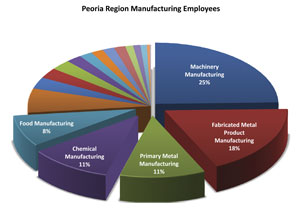A rapid shift in innovation has caused a change in the required skill set for manufacturing employees.
An employee stares intently at a computer monitor, carefully scrutinizing diagnostic software, adjusting minute settings according to up-to-the-second conditions. Highly trained, this employee is qualified to monitor and control every aspect of the workroom environment, from sophisticated computer processes to the sensitive workings of intricate machinery. Naturally, one might assume that this individual is a PhD scientist or an engineer with a master’s degree and 20 years of experience in industry. One might be surprised to learn that this worker is an illustration of the modern manufacturing climate.
Quite plainly, manufacturing is evolving. It is no longer solely the world of cavernous factories and dirt and grime; workers no longer go home covered in grease and soot. Not to say that employees don’t work up a sweat or that vast spaces aren’t needed: large manufacturing is still a critical component of the economy on a local, state and national scale. However, specialized manufacturing has developed naturally, out of progress and necessity. Rapid technological innovation and productivity increases have caused manufacturing to become intensively specialized. With explosions in computing power and automation, the very definition of the factory has become blurred, and facilities often resemble scientific labs more than the traditional notion of a manufacturing facility.
Such changes demand a workforce with an expanded skill set, and employees now need more than a desire to work with their hands. Employees must now possess well-developed technical skills, creativity and logical problem-solving capabilities. These rapid changes have increased demand for talented labor, and specialized manufacturers are seeking prospective employees for jobs that offer family wages and excellent benefits.
That is where the Specialized Manufacturing Strategy Group of the Economic Development Council steps in. One year ago, the EDC organized 11 strategy groups to develop existing comparative advantages of the Greater Peoria Region and create jobs through business expansion, retention and recruitment. Each group focuses on a particular advantage and consists of volunteer professionals working to bolster the local economy. According to EDC Chief Operating Officer Vickie Clark, “Manufacturing is one of our region’s key job growth areas, and the Specialized Manufacturing Strategy Group is a critical component in our efforts to retain, expand and recruit companies in this business sector.” With workforce development as one of its main concerns, the Specialized Manufacturing Strategy Group is a diverse committee that represents a wide variety of interests in the area of specialized manufacturing.

Members of the strategy group include representatives of manufacturers large and small, educators at the secondary and post-secondary level, and professionals who work with manufacturing firms. Together, they aim to demonstrate the attractiveness of employment in modern manufacturing and supply local firms with quality employees. Their initiatives include collaborative efforts between firms and educators, internal training and public policies to facilitate educational improvements.
For instance, Advanced Technology Services (ATS) and Illinois Central College collaborate to offer the Multi-Skilled Technical Career Program, a 40-week certificate course that prepares students to maintain mechanical and electrical production assets. According to Jessica Bulfer of ATS, students spend 32 hours a week on their education, developing practical skills under experienced teachers. The program commenced with a group of seven students, and another 17 comprise the second class. ATS and ICC are optimistic about the potential growth of the program; a third wave of students will begin this fall. The program targets high school students, displaced workers and members of the military, and loans, grants and the GI Bill can be used to defray the cost of tuition.
On the secondary educational level, PERFECT (Peoria Educational Region for Employment and Career Training) administers and coordinates career and technical education programs in the area, and the program has oversight in District 150 high schools, as well as schools from Dunlap to Princeville. PERFECT, in partnership with area businesses and the union construction industry, offers services ranging from career day events for students to job shadow experiences for teachers.
Of particular interest is the Construction Industry Work-Based Learning Program, a vocational curriculum that allows students to spend one week at various apprenticeship schools engaged in hands-on activities and construction-related coursework. The program includes OSHA safety training, blueprint reading, estimating and project management, and students are able to participate in internships at local union contractors in their chosen vocation.
Elsewhere, several additional programs in place assist high school students pursuing their education and help them transition to a career in specialized manufacturing. As a private firm collaborating with the educational system to cultivate skilled employees, Excel Foundry and Machine works with Pekin High School to incorporate students into its labor force through work-based learning. Additionally, Peoria Promise has the potential to be incredibly beneficial for specialized manufacturing. A program for residents of Peoria who graduate from a public high school, Peoria Promise will subsidize educational expenses at ICC and help Peorians obtain degrees and certificates as they train for work in modern manufacturing.
Family-wage jobs and excellent benefits are available to those who obtain employment in specialized manufacturing; however, the rapid shift in innovation has caused a change in the required skill set for manufacturing employees. Through the work of the Specialized Manufacturing Strategy Group, central Illinois is readying its future workers for meaningful employment, thereby bolstering the local economy and strengthening our comparative advantage in specialized manufacturing.
For additional information on the Specialized Manufacturing Strategy Group, contact Sally Hanley, Business Development Director at the EDC (309-495-5953, [email protected]). iBi


